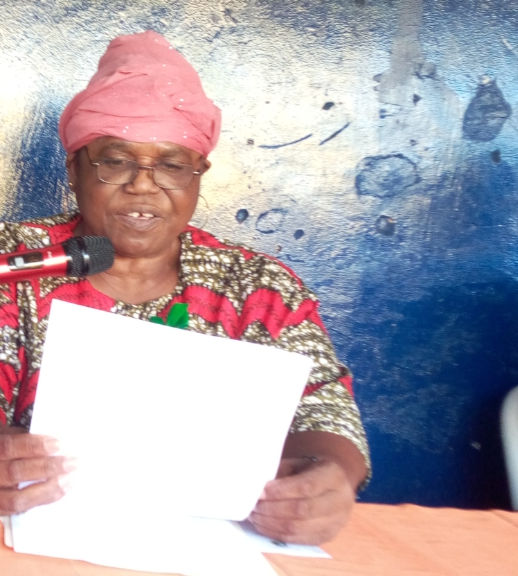Mental Health Patients Rally for More Budgetary Support

Bendu Yates, a mental health survivor who delivered the keynote address at this year’s World Mental Health Day program, held in Paynesville.
...Say the sector is underfunded
In Liberia, thousands of people suffer from mental health disabilities such as fear, panic, trauma, isolation, stress, and stigma among others.
According to the World Health Organization (WHO), people in such conditions are not only discriminated against, stigmatized and marginalized, but are also subjected to emotional and physical abuses within their own communities.
However Madam Bendu Yates, a mental health survivor who delivered the keynote address at this year’s World Mental Health Day program, held in Paynesville, called on members of the 54th Legislature to see the need and act immediately to increase the budgetary allocation for mental health services in the country.
She said people living with mental illness are optimistic about the future “so, when dealing with them, please do not be pessimistic that there is no future for them.”
Madam Yates, an outpatient of the Edward S. Grant Center at the John F. Kennedy Memorial Hospital, decried the height at which discrimination and stigmatization of people with mental disabilities are subjected in the country. According to her, such discrimination has become a normal thing, forcing people in that category of life to live in isolation.
She described the malaise as ‘cumbersome’ and could only exacerbate the health conditions the people are engulfed in.
The program was organized by the Government of Liberia through the Ministry of Health, in partnership with the WHO, Migrants As Messengers of the International Organization for Migration (IOM), Carter Center, respectively. It was held under the theme: “Mental Health in an Unequal World.”
According to her, there is limited attention and funding for mental health in the world and with the current budget passed for the fiscal year 2021, mental health in Liberia received only US$20,000, which is not enough to cater to patients.
Madam Yates further called on lawmakers and the national government to add mental health on the health priority list and invest in mental health services as they do in other health programs.
Madam Yates further stressed the need for the creation of more awareness programs to stop the stigma and discrimination against people living with mental health illness as well as communities wake up and act now because mental health is everybody business.
“If these things are done, she said, mentally healthy citizens will make a healthy and productive nation.”
According to Madam Davidetta Parker, Chairperson of the Program Planning Committee and Administrator of ES Grant Hospital, this year’s celebration is to highlight the present state of affairs of mental health in the country and bring together government officials, international development partners and other stakeholders so as to set a road map of how to craft out policy and programs for the improvement of the mental health in the country.
“We are holding this program in this place, the first facility to handle cases of mental related challenges. But over the years, the place has been abandoned, especially owing to the civil war. So, this is like a way of bringing everybody together at this place so as to restrategize the way forward”, she said.
Deputy Minister of Health and Chief Medical Officer of Liberia, Dr. Francis Kateh thanked the organizers of the program for the efforts put in place for successful execution. He also thanked the development partners who over the years have identified with the mental health project and seek more support to solve most of the challenges facing the area of the general health sector of the country.
He acknowledged the financial constraints of the government but believed a new roadmap was put in place to overhaul government policy and programs aimed at addressing the challenges in the area of mental health.
While not ruling out the possibility of renovating and rehabilitating the Catherine Mills Mental Rehabilitation Center, he is of the view that if the new roadmap being talked about brings out good meaning, stakeholders should be thinking about moving to a new site and building a modern structure.
“We are talking about a new roadmap for mental health in the country so it will be a good thing to reflect that when this place was established some years ago, this place was a bush. People used to come here and hunt for animals and it was an isolated community. But today, it is almost in the middle of the town. The funds needed to relocate people from around here in order to renovate this place will be enough to build a modern place with all facilities, he said.
Meanwhile, the celebration coincided with testimonies from individuals who were once mentally challenged but got cured through various mental health interventions at the Catherine Mills Center and the E.S. Grant Center and now leading productive lives.
Their testimonies were moving, touching and showed that mental patients still have hope of being cured and living meaningful lives.
